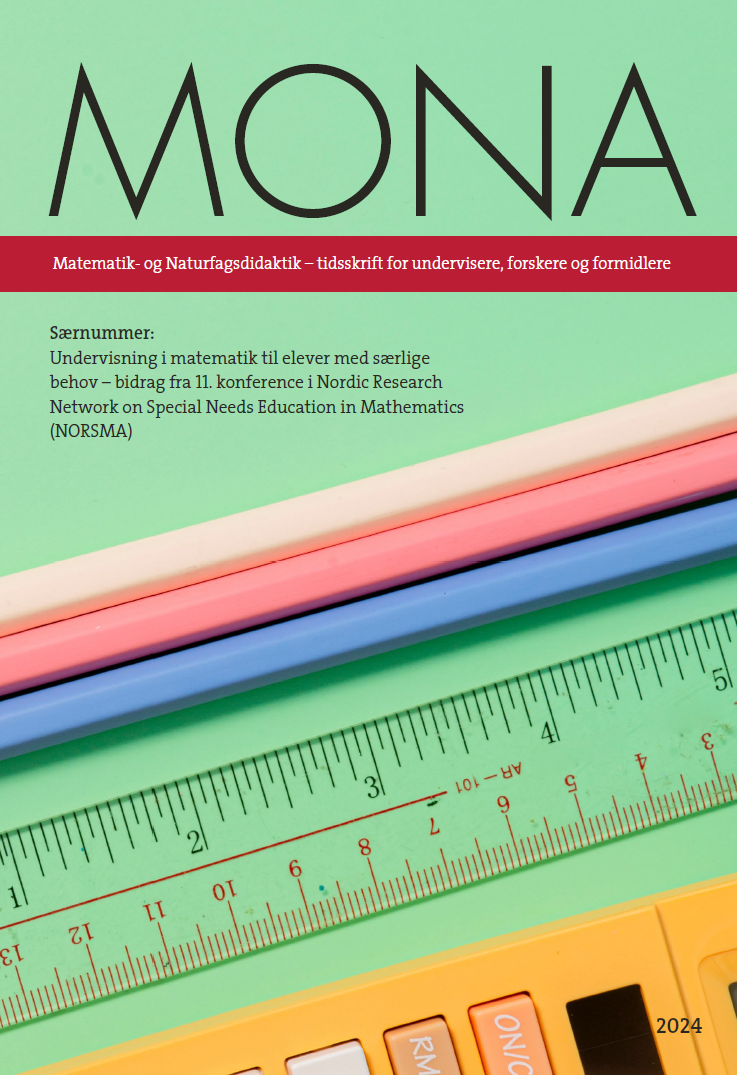Resumé
In this developmental project we present a first version of a dyscalculia simulator. The goal was to support mathematics teachers to better understand the difficulties students with dyscalculia experience in mathematics lessons. We therefore developed a virtual classroom where it is possible to experience some of the same difficulties as a person with dyscalculia would in a mathematics lesson. The simulator was tested on teachers and student teachers. The results show that the dyscalculia simulator has the potential to provide insights and reflections on how students with dyscalculia experience the processing of numbers and numerical information typical of school mathematics.
Referencer
American Psychological Association. (2017). Ethical principles of psychologists and code of conduct (2002, amended effective June 1, 2010, and January 1, 2017). http://www.apa.org/ethics/code/index.html
PBS (n.d.). Misunderstood Minds, Decoding Activity. PBS.org. Retrieved from https://www.pbs. org/wgbh/misunderstoodminds/experiences/readexp1a.html
Bengtsson, S. & Larsen, L. B. (2013). “Talblindhed – en forskningsoversigt.” SFI – Det Nationale Forskningscenter for Velfærd
Billon, G., Attoe, C., Marshall-Tate, K., Riches, S., Wheildon, J., & Cross, S. (2016). Simulation training to support healthcare professionals to meet the health needs of people with intellectual disabilities. Advances in Mental Health and Intellectual Disabilities, 10(5), 284‑292.
Davis, J. F., Sørensen, J. K., Genster, N. & Rasmussen, S. L. (2023). Simulation development for allowing a deeper understanding of dyscalculia. Bachelor project – Science in Engineering (Game Development and Learning Technology). Syddansk Universitet.
Dyslexia Simulator (n.d.). HGSE Teaching and Learning Lab. Retrieved from https://tll.gse.harvard.edu/dyslexia-simulator
Egmont (2023). Egmont Rapporten 2023. Regn med os – bedre hjælp til børn og unge i matematikvanskeligheder. Egmont.
Epinion. (2020). Forskningsoversigt om talblindhed. DPU. https://emu.dk/sites/default/files/2020‑11/Forskningsoversigt%20om%20talblindhed_2020.pdf
Fanning, R. M., & Gaba, D. M. (2007). The role of debriefing in simulation-based learning. Simulation in healthcare, 2(2), 115‑125. DOI: 10.1097/SIH.0b013e3180315539
Issenberg, S. B., McGaghie, W. C., Petrusa, E. R., Lee Gordon, D., & Scalese, R. J. (2008). Effectiveness of simulation-based learning in health professions education: A systematic review and meta-analysis. Academic Medicine, 83(10), 1‑10.
Kolb, D. A. (1984). Experiential learning: Experience as the source of learning and development. Prentice-Hall.
Meyers, S., Rowell, K., Wells, M., & Smith, B. C. (2019). Teacher empathy: A model of empathy for teaching for student success. College Teaching, 67(3), 160‑168.
Mikkelsen, M., Rangvid, B. S. & Jensen, V. M. (2023) Børn og unge i matematikvanskeligheder. En registeranalyse af konsekvenser og kendetegn. VIVE, Det Nationale Forsknings- og Analysecenter for Velfærd.
Pallavicini, F. (2020). Video Games to Foster Empathy: A Critical Analysis of the Potential of Detroid: Become Human and the Walking Dead. Lecture Notes in Computer Science.
Park, Y., Gi Seo, D., Martin, M., & Lee, J. (2024). An Exploration of Causal Relationships Between Behavioural/Emotional Difficulties and Academic Achievement: A Path Model Approach. International Journal of Disability, Development and Education, 1‑19. https://doi.org/10.1080/1034912X.2024.2337172
Price, G. R., & Ansari, D. (2013) Dyscalculia: Characteristics, Causes, and Treatments. Numeracy 6(1), Article 2. DOI: http://dx.doi.org/10.5038/1936‑4660.6.1.2
Tong, X., Ulas, S., Jin, W., Gromala, D., & Shaw, C. (2017). The design and evaluation of a bodysensing video game to foster empathy towards chronic pain patients. In Proceedings of the 11th EAI International Conference on Pervasive Computing Technologies for Healthcare (pp. 244‑250).
Vallentin-Holbech, L. & Majgaard, G. (2020) Co-Creating a Virtual Alcohol Prevention Simulation with Young People. International Journal of Environmental Research and Public Health.
Vigna, G., Ghidoni, E., Burgio, F., Danesin, L., Angelini, D., Benavides-Varela, S., & Semenza, C. (2022). Dyscalculia in early adulthood: implications for numerical activities of daily living. Brain Sciences, 12(3), 373.

